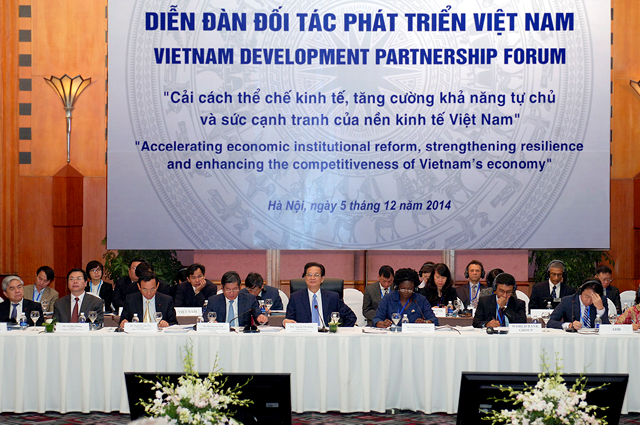Private sector development for a sustainable and autonomic economy was one of the two main topics of discussion at the Vietnam Development Partnership Forum (VDPF) 2014 that took place in Hanoi on Friday.
The VDPF, co-hosted by the Ministry of Planning and Investment and the World Bank, focused on economic institutional reform and development of the domestic private sector under the theme of “Accelerating Economic Institutional Reform, Strengthening Resilience and Enhancing the Competitiveness of Vietnam’s Economy.”
The market institutional reform is necessary to improve competitiveness of the economy, whereas the development of the private sector contributes to build a sustainable and autonomic economy, the World Bank said on its website.
“No country has developed through predominant reliance on the foreign private sector,” World Bank Vietnam Country Director Victoria Kwakwa, the forum’s co-chair, said in her opening remarks.
Kwakwa hailed the Vietnamese government’s growing attention to the emergence of a dynamic and vibrant domestic private sector as “wise and timely.”
“Further deepening of trade integration through the ASEAN economic community, EFTA, TPP, the trade agreement with Korea and several others could provide opportunities for promoting Vietnam’s domestic private sector,” she said.
The country director added that the goal cannot be achieved without “a strong public sector, through various institutional reforms to address the challenges that enterprises face.”
Vietnam’s private sector has struggled over the last few years, with several enterprises having closed, and the ‘survivors’ have remained at a predominantly informal, micro, small and medium scale, according to the World Bank official.
“Domestic firms have not benefitted adequately from positive spill-over effects from FDI enterprises and their integration into global value chains has remained fragmented and limited,” she said.
Kwakwa said state-owned enterprise (SOE) reform could be a platform for promoting larger-size domestic enterprises, and the continued restructuring of the SOE sector will be important in the private sector development.
She noted, however, that the ongoing SOE reforms need to focus less on the number of equalizations and more on their quality.
“Actions to strengthen SOE transparency through regular and credible disclosure, to end preferential access to land and capital for SOEs, and to impose hard budget constraints will be critical for a more efficient public sector and for creating space for the domestic private sector to grow,” she said.
Speaking at the end of the forum, Prime Minister Nguyen Tan Dung appreciated the recommendations made at the event and asserted that Vietnam “is completely capable of doing better and more effectively.”
The premier listed several achievements of his country in 2014, such as the projected $1.5 billion trade surplus in the third consecutive year.
He added that 432 SOEs will complete privatization next year and the equalizations will focus more on quality than numbers by reducing the public ownership in the entities.
“Vietnam will improve the effectiveness of SOEs and put them in a fair and transparent environment,” Dung concluded.
First held in 2013, the annual VDPF replaces the Consultative Group Meeting for Vietnam, which used to bring together participants from the Vietnamese government and representatives of about 50 bilateral and multilateral donors to the country.
The replacement marked the change of Vietnam from a country that received more than $80 billion in official development assistance in 20 years to a development partnership country, the Vietnamese Government Office said in a statement.
The VDPF is a platform for high level dialogue that supports substantive policy discussion between the government of Vietnam, its development partners, the private sector, and other organizations to foster broad-based socio-economic development and improved well-being for all Vietnamese, according to the World Bank.
Like us on Facebook or follow us on Twitter to get the latest news about Vietnam!


















































